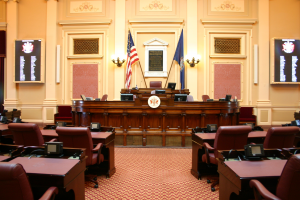 by Grady Brown There has been some recent action in the Virginia General Assembly concerning state marijuana laws. At the end of January, the Senate Courts of Justice Committee killed Senate Bill 686, which would have decriminalized marijuana possession and lowered the penalty for possession from $500 to $100. However, the Republican controlled Courts and Justice Committee rejected the bill in a party line 9 – 5 vote. The bill was faced with strong opposition from law enforcement organizations. While the Senate rejected decriminalization, it did pass Senate Bill 1235, which would loosen medical restrictions on cannabis oils. A similar bill in the House of Delegates has also passed through committee. Should the bill be signed into law, epilepsy patients in the Commonwealth would be able to use marijuana oils to help treat seizures. Gov. Terry McAuliffe has already expressed his support for the bill. The mixed results in Richmond show a divided General Assembly, but a March 2014 poll from Quinnipiac University poll reported 84 percent of Virginia voters supported legalizing medical marijuana, while 13 percent were opposed. However, legalized marijuana for recreational use is still divided, with 46 percent of Virginia voters in favor and 48 percent opposed. The poll’s margin of error was +/- 2.7 percent. National support for legalized marijuana is also increasing, with a recent Gallup Poll showing 51 percent in favor and 47 percent opposed with a 4 percent margin of error.
0 Comments
by Haley Swartz
In advance of the upcoming reauthorization of the Child Nutrition Act, public dialogue and political action must shift to emphasize exercise and physical education courses, in addition to a balanced, nutritionally rich diet. Congress amends the CNA every five years to reflect new research on public health trends and refocus the goals of the National School Lunch Program. Preceding the most recent CNA reauthorization, First Lady Michelle Obama launched the Let’s Move!initiative to end childhood obesity in February 2010. This program reflected a new emphasis on childhood obesity within the 2010 reauthorization of the CNA, or the Healthy Hunger Free Kids Act of 2010. However, this law will expire on September 30, 2015. The Centers for Disease Control and Prevention estimates one-third, or 12 million American children and adolescents, were overweight or obese in 2012. According to the Pew Research Center, 69 percent of Americans see obesity as a “very serious public health problem.” While 57 percent of Americans believe government should play a significant role in reducing obesity among children, only 42 percent of the public believes the government should address adult obesity. by Carter Blackwell
Medicaid expansion would cost Virginia $137.5 million dollars over the 2014-2022 period, with yearly costs rising as time progresses. Expansion would increase costs to Virginia and reduce incentives for private investment in health insurance. Refusal to expand the Medicaid program is in the best interest of the Commonwealth and provides the state with the most economic stability in the long run. More than one million Virginia residents currently receive Medicaid and our state legislature is responsible for 50 percent of the funding. The Commonwealth spends over three billion dollars per year on Medicaid, comprising 21 percent of our state’s annual budget. Expansion aside, Medicaid costs are steadily rising at nine percent per fiscal year as the number of program participants continues to increase. The Commonwealth of Virginia is one of many states currently undecided regarding the expansion of Medicaid through the Affordable Care Act. While Gov. McAuliffe supports the move, Republicans in the State House and Senate stand in vehement opposition. Acceptance or denial of ACA expansion will greatly affect those in need of healthcare as well as those in the private insurance and healthcare industries. by Benjamin Paul
Virginia should expand its Medicaid program without delay. Expanding coverage to as many as 400,000 uninsured, low-income Virginians will save lives. It is also a great deal for Virginia taxpayers and for the state economy. First, a brief review: The United States established Medicaid in 1965 as a joint federal and state public insurance program for low-income Americans. Once considered an afterthought to Medicare, the federally financed insurance program for the elderly and long-term disabled, Medicaid is now the largest health care insurer in the country – covering over 62 million Americans – and a key foundation of this country’s safety net. Despite these two programs, the number of Americans without insurance grew rapidly through the second half of the 20th century. By 2008, the U.S. Census Bureau estimated that 46.3 million Americans were uninsured. Nonetheless, attempts at comprehensive reform eluded policymakers. The tide changed with the passage of the landmark Patient Protection And Affordable Care Act in 2010. The drafters of the ACA envisioned two major pathways for increasing the number of Americans with health insurance. The first pathway was for the federal government to provide sliding scale subsidies to individuals to purchase private insurance through new, online marketplaces. by Joseph Liss
The Virginia General Assembly is currently in the heat of the Medicaid expansion debate. While the Republican-controlled House of Delegates and Senate both rejected Medicaid expansion, Democratic Gov. Terry McAuliffe made the issue a central campaign pledge. With the debate only heating up, The Third Rail thought this would be the right time for some thoughtful analysis to break through the partisan rhetoric. Check out Benjamin Paul’s column supporting expansion, which offers some background information, and Carter Blackwell’s case against the reforms. We encourage your insightful comments and hope these articles provide a fruitful forum for debate. If you have any questions or would like to write an article for the The Third Rail, please contact Senior Online Editor Joseph Liss at [email protected]. |
Categories
All
Archives
April 2022
|
ADDRESSVirginia Policy Review
235 McCormick Rd. Charlottesville, VA 22904 |
|
|